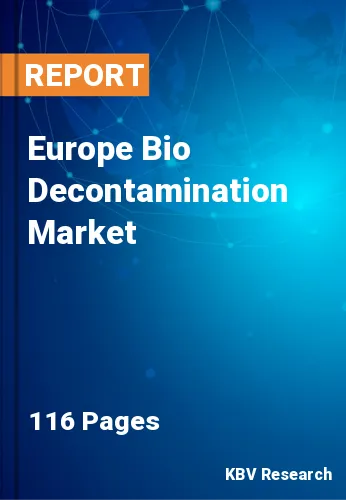The Europe Bio Decontamination Market would witness market growth of 7.1% CAGR during the forecast period (2023-2030).
Healthcare workers frequently face great pressure to provide results quickly while working with a small budget. Customers want a quick, economical solution that costs less money. The bio-decontamination technique used mustn't damage expensive equipment or the working environment in addition to the cost of the service itself. These elements may prevent the market from growing in terms of income.
Adding light-activated photosensitizers to surfaces, like nanoscale titanium dioxide, and then using ultraviolet (UV) radiation to produce reactive oxygen species that can disinfect surfaces have been the subject of recent research. Research on light-activated photosensitizers is still in its early stages; therefore, additional data on the usefulness and effectiveness of using this technique is anticipated. Therefore, due to cutting-edge research, emerging breakthroughs like these are anticipated to spark a significant increase in demand for superior bio-decontamination products and services.
The elderly population is quickly expanding in various European nations. 520 million people will reside in the EU in 2070, an increase from 511 million in 2016, according to the EU's 2018 Ageing Report. From 333 million in 2016 to 292 million in 2070, the working-age population, meaning those between the ages of 15 and 64, will decrease. Each of these supports the expansion of the market in Europe. In England, falls & fractures were the most common and harmful health issues that older people encountered.
The overall cost of fragility fractures in the UK has been estimated at £4.4 billion, with £1.1 billion going toward social care, based on the consensus statement on fractures and falls that Public Health England & the National Falls Prevention Coordination Group released in January 2017. Hip fractures account for nearly £2 billion of this total. Falls in hospitals were among the most common patient safety-related incident, with approximately 240,000 complaints in acute hospitals or mental health trusts in England and Whales. These factors would lead to an increase in hospital visits, which would make HAI risk even more likely. Therefore, there would be an increase in the requirement for bio decontamination, leading to market expansion in the Europe region.
The Germany market dominated the Europe Bio Decontamination Market by Country in 2022, and would continue to be a dominant market till 2030; thereby, achieving a market value of $25,702 Thousands by 2030. The UK market would showcase a CAGR of 6.2% during (2023 - 2030). Additionally, The France market is anticipated to growth at a CAGR of 7.9% during (2023 - 2030).
Based on Agent Type, the market is segmented into Hydrogen Peroxide, Chlorine Dioxide, Paracetic Oxide, and Nitrogen Dioxide. Based on Product & Service, the market is segmented into Equipment, Services, and Consumables. Based on Type, the market is segmented into Chamber Decontamination, and Room Decontamination. Based on End User, the market is segmented into Pharma & Medical Device Companies, Life Science & Biotechnology Research Organizations, and Hospitals & Healthcare Facilities. Based on countries, the market is segmented into Germany, UK, France, Russia, Spain, Italy, and Rest of Europe.
Free Valuable Insights: The Worldwide Bio Decontamination Market is Projected to reach USD 393.7 Million by 2030, at a CAGR of 7.3%
The market research report covers the analysis of key stake holders of the market. Key companies profiled in the report include STERIS PLC, Ecolab, Inc., TOMI Environmental Solutions, Inc., JCE Biotechnology SAS, Fedegari Autoclavi S.p.A., Zhejiang TAILIN Bioengineering Co., Ltd., Howorth Air Technology Limited, Solidfog Technologies SPRL, ClorDiSys Solutions, Inc., and Amira Srl.
By Agent Type
By Product & Service
By Type
By End User
By Country
Our team of dedicated experts can provide you with attractive expansion opportunities for your business.

